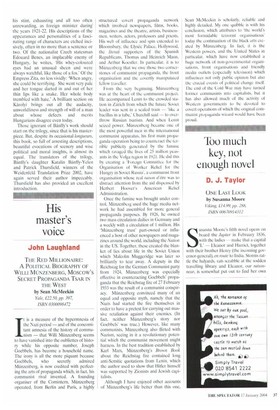His master's voice
John Laughland
THE RED MILLIONAIRE: A POLITICAL BIOGRAPHY OF WILLI MONZENBERG, MOSCOW'S SECRET PROPAGANDA TSAR IN THE WEST by Sean McMeekin Yale, £22.50, pp. 397, ISBN 0300098472 It is a measure of the hypermnesia of the Nazi period — and of the concomitant amnesia of the history of communism — that Willi Miinzenberg seems to have vanished into the oubliettes of history while his opposite number, Joseph Goebbels, has become a household name. The irony is all the more piquant because
Goebbels, who secretly admired Miinzenberg, is now credited with perfecting the arts of propaganda which, in fact, his communist rival invented. A founding organiser of the Comintern, Miinzenberg operated. from Berlin and Paris, a highly
structured covert propaganda network which involved newspapers, films, books, magazines and the theatre, artists, businessmen, writers, actors, professors and priests. His web of influence and spin extended to Bloomsbury, the Elysee Palace, Hollywood, the literati supporters of the Spanish Republicans, Thomas and Heinrich Mann, and Arthur Koestler. In particular. it is to Mfinzenberg that we owe those two cornerstones of communist propaganda, the front organisation and the covertly manipulated fellow traveller.
From the very beginning. Mtinzenberg was at the heart of the communist project. He accompanied Lenin to the crowded station in Zurich from which the future Soviet leader was sent in a sealed train — like a bacillus in a tube,' Churchill said — to overthrow Russian tsarism. And when Lenin seized power. Mtinzenberg became one of the most powerful men in the international communist apparatus, his first main propaganda operation being to counteract the terrible publicity generated by the -famine which ravaged the lives of 25 million peasants in the Volga region in 1921. He did this by creating a 'Foreign Committee for the Organisation of Worker Relief for the Hungry in Soviet Russia', a communist front organisation whose real raison d'etre was to distract attention from the aid dispensed by Herbert Hoover's American Relief Administration.
Once the famine was brought under control, Miinzenberg used the huge media network he had assembled for more general propaganda purposes. By 1926, he owned two mass circulation dailies in Germany and a weekly with a circulation of 1 million. His 'Miinzenberg trust' part-owned or influenced a host of other newspapers and magazines around the world, including the Nation in the US. Together, these created the blanket of lies about life in the Soviet Union which Malcolm Muggeridge was later so brilliantly to tear away. A deputy in the Reichstag for the German Communist party from 1924, Milnzenberg was especially effective in counteracting Goebbels' propaganda that the Reichstag fire of 27 February 1933 was the result of a communist conspiracy. Miinzenberg convinced many of an equal and opposite myth, namely that the Nazis had started the fire themselves in order to have a pretext for carrying out massive retaliation against their enemies. (In fact, neither Miinzenberg's story nor Goebbels' was true.) However, like many communists, Miinzenberg also flirted with Nazism, seeing in it a revolutionary potential which the communist movement might harness. In the best tradition established by Karl Marx, Mfinzenberg's Brown Book about the Reichstag fire contained long anti-Semitic quotations from Lenin, which the author used to show that Hitler himself was supported by Zionists and Jewish capitalists.
Although I have enjoyed other accounts of Miinzenberg's life better than this one, Sean McMeekin is scholarly, reliable and highly detailed. My one quibble is with his conclusion, which attributes to the world's most formidable terrorist organisations' today the continuation of the black arts created by Mtinzenberg. In fact, it is the Western powers, and the United States in particular, which have now established a huge network of nun-governmental organisations, front organisations and friendly media outlets (especially television) which influences not only public opinion but also the crucial events of political change itself. [he end of the Cold War may have turned former communists into capitalists, but it has also allowed much of the activity of Western governments to be devoted to covert operations of which the original communist piopaganda wizard would have been proud.


































































 Previous page
Previous page